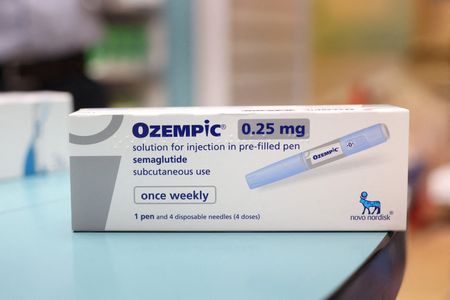By Brendan Pierson
(Reuters) – Drug compounders sued the U.S. Food and Drug Administration on Monday over its decision last week to remove Novo Nordisk’s weight-loss and diabetes treatments Wegovy and Ozempic from its shortage list, a move that will sharply curtail the ability of compounders to sell cheaper versions of the medicines.
The lawsuit, filed in Fort Worth, Texas federal court by the Outsourcing Facilities Association, a compounding industry group, and a Texas-based compounding pharmacy operator claims the FDA’s finding that there was no longer a shortage of the drugs’ active ingredient semaglutide was arbitrary and capricious.
The FDA declined to comment on the lawsuit.
The Outsourcing Facilities Association and FarmaKeio Custom Compounding filed a similar lawsuit against the agency last year over its removal of tirzepatide, the active ingredient in Eli Lilly’s rival weight-loss and diabetes drugs Zepbound and Mounjaro, from the shortage list. That case remains pending, with the association seeking a preliminary ruling blocking the FDA’s decision.
U.S. regulations allow compounding pharmacies to manufacture and sell large quantities of brand-name medicines only if they are in short supply.
Americans who cannot afford Wegovy or have struggled to find it have been turning to often cheaper versions sold by compounding pharmacies and telehealth providers like Hims & Hers and WeightWatchers. Wegovy has been shown to help patients lose as much as 15% of their weight on average.
The Outsourcing Facilities Association and FarmaKeio allege in both lawsuits that shortages of the drugs persist, and that the FDA wrongly trusted the manufacturers’ claim that they could meet demand without considering evidence that patients were still having trouble accessing the medicines.
The FDA last October agreed to reconsider its decision about tirzepatide in response to the lawsuit, but in December said its conclusion remained the same.
In lifting the shortage for both drugs, the FDA said compounders would have a 60- to 90-day grace period before they could face enforcement.
(Reporting By Brendan Pierson in New York; Editing by Leslie Adler, Bill Berkrot and Alexia Garamfalvi)









